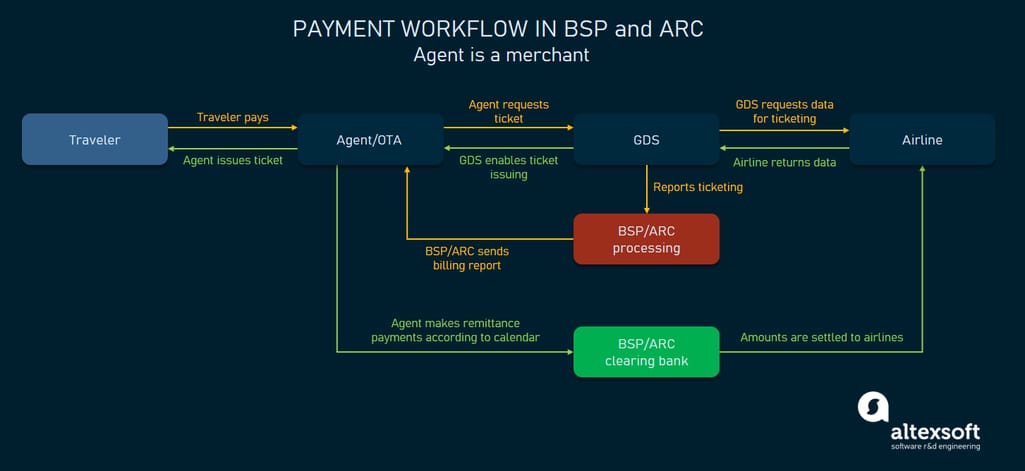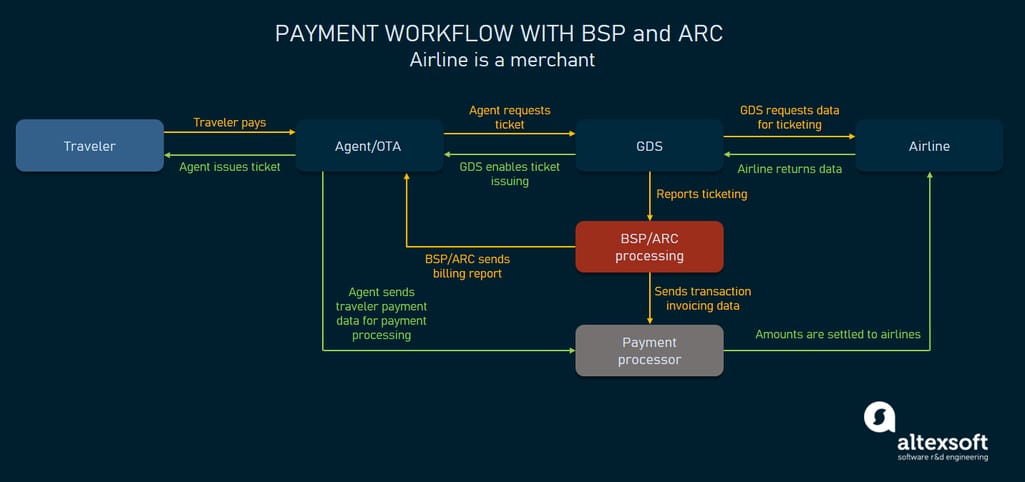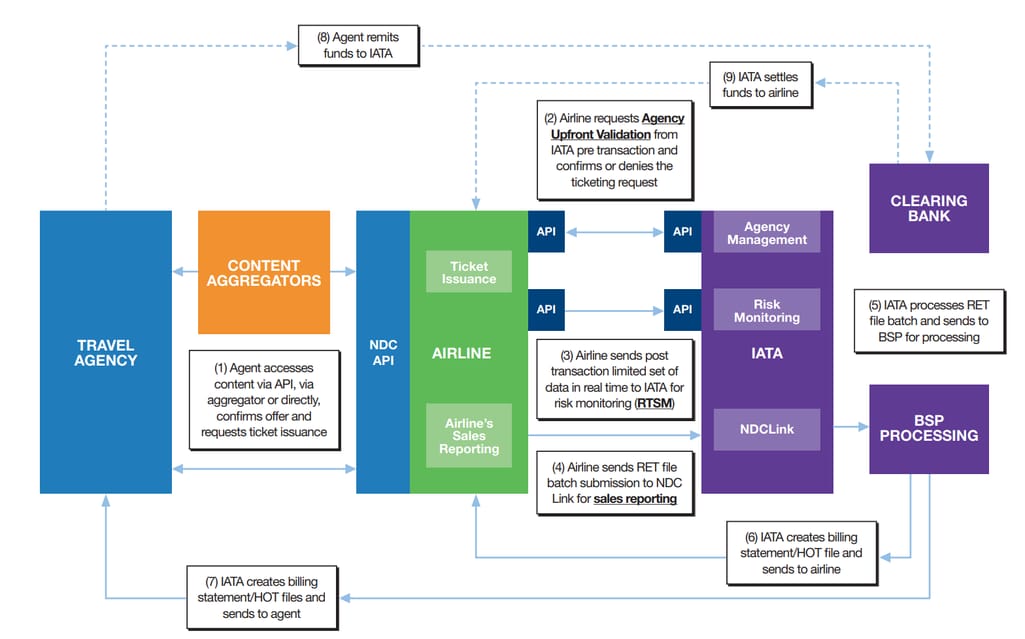

BSP and ARC are two abbreviations that people getting involved in the travel agency business stumble across early on. Things are quite confusing here and nascent travel agents can easily get overwhelmed trying to understand what IATA is, how IATAN is different, why an ARC number is the same as an IATAN number… And a whole lot of other questions.
In this article, we’ll figure out what BSP and ARC mean to you – and more importantly – why you should care. And care you will if you’re a travel agent that wants to issue flight tickets on behalf of airlines. While you can read our blog in any order you like, this article tastes better after you’ve read our IATA accreditation guide. Start there and then come back. If you already know what IATA accreditation is, keep reading.
BSP or Billing and Settlement Plan is an IATA electronic billing system to run and simplify the interchange of data and funds between travel agencies and airlines. Sounds complicated, but in plain English, BSP is a payment mediator between airlines and travel agents. BSP is a conduit, kind of similar to a GDS. As GDSs aggregate inventories across all connected airlines and present a wide variety of them to agents, BSP collects payments from agents and distributes them across airlines.
Why does BSP exist? Well, BSP acts as a single point of remittance and settlement of money. Without it, each travel agent would have to connect individually with every single airline. And of course, BSP is a system that belongs to IATA, while IATA itself is owned by airlines and represents their interests. So, instead of vetting each individual travel agent to allow them to ticket flights, an airline trusts IATA to do that instead.
ARC or Airline Reporting Corporation is an organization that… does basically the same, but in the US, and also Puerto Rico, Virgin Islands, and American Samoa. In these regions, ARC is an accounting entity that belongs to airlines and covers all transactions between agents and carriers.
The key difference between IATA and ARC is that IATA’s responsibilities are way broader as it’s the main standard-setter in the airline industry. ARC mostly focuses on financial relationships between airlines and travel agents in the US.
So, a simple thing to remember is, if you’re a US-based agency, you need ARC. Airline Reporting Corporation provides its own accreditation for the US-based locations. If you belong somewhere else, BSP and IATA are your abbreviations of choice.
So, how do funds from travelers get to airlines, when a traveler buys a ticket from the agent? Actually, there are two main scenarios and a lot more of extra ones that go way beyond the scope of this article.
The first scenario is when the agent is a merchant of record. In this case, you as an agent sell tickets to travelers, get money in your merchant account, and then pay airlines via a BSP or ARC clearing bank.

In this case, BSP/ARC play the major role in a transaction
The second scenario is when the airline is a merchant of record. In this scenario, a traveler will be using a payment gateway on the agent’s side to pay for the ticket only directly to an airline, instead of paying an agent. Obviously, a traveler’s form of payment must be supported by an airline. Here’s a convenient way to track the airline's supported forms of payments at ARC.

This scenario doesn’t involve BSP/ARC clearing bank, but they are still involved in a transaction
There are also several additional scenarios besides these two, including IATA Easy Pay method, or when the GDS itself acts as a merchant. To learn more, check BSP Manual for Agents by IATA and Industry Agent’s Handbook by ARC.
These two documents go into detail about how these systems work.
If you’re wondering how the process looks for NDC-based payments that bypass GDSs, there aren’t that many differences. The processing still goes through BSP/ARC. To learn more about NDC, check our article on that topic.

Here’s an IATA’s visualization of the BSP in NDC
Both systems come with their own web interfaces for travel agencies and airlines to exchange information between all participants in the process.
Let’s repeat, you must be accredited by IATA or ARC to issue tickets on behalf of airlines. If you operate in the US, you get ARC accreditation. For the rest of the world, you need IATA. Once you become accredited and start your business operations, you undergo annual review and revalidation processes.
We aren’t going to discuss in much detail how the accreditation at IATA is obtained. For that, you can check the separate article linked in the beginning of this one. And of course, check IATA’s agent accreditation materials. In a nutshell, IATA suggests standard accreditation for ticketing and TIDS (travel industry designator services) for agents that don’t need ticketing.
One thing we should mention is that before the Covid-19 outbreak, IATA was gradually rolling out three new accreditation options across its agents. They all expand standard IATA ticketing accreditation and directly impact BSP workflow.
GoLite. A simple accreditation option for agents. It doesn’t support an agent being a merchant. Instead, the merchant of record with GoLite can be an airline or an agent can use a new IATA EasyPay method (e-wallet for travel agents). Since there are no deferred payments, this type of accreditation doesn’t require financial reviews and other strict audits from IATA.
GoStandard. This is the traditional way of accreditation that we described in our article. It’s the main approach for travel agents that supports all types of payment methods, including the agent being a merchant, an airline being a merchant, and IATA EasyPay.
GoGlobal. This is the option for large travel agencies that have many agents and many Billing and Settlement Plan workflows simultaneously. Basically, it helps larger agencies avoid accreditation procedures for each of their accredited agents.
You’ve likely heard of IATAN, another entity that operates in the US and looks suspiciously similar to IATA. Well, exactly. IATAN is a US-based branch of IATA. Does it mean you can issue tickets using your IATAN accreditation if you are in the US?
Yes, you can. But here’s the catch. If you want to ticket via IATAN, you still need ARC-certification. And if you are ARC accredited, IATAN will keep your same agency code number. Also, IATAN still has non-ticketing options available.
But why do you even need IATAN?
Well, the initial idea was to have ARC for domestic US flights and IATAN for international travel. But now, both domestic and international flights recognize ARC. However, IATAN remains the sign of international recognition and many travel agents keep both. On top of that, you can get some discounts from airlines by having the IATAN accreditation.
We aren’t going to describe the full accreditation set for IATAN here, because again you can find it in our main IATA accreditation guide.
If you plan to do flight ticketing, you still need one of either certification, depending on your location.
Host agency. This is a pretty common option across travel agencies and OTAs. A host agency is the one that owns BSP/ARC certification and shares its agent code with non-accredited agents. This removes a lot of hassle related to the reporting and accreditation process.
CLIA (Cruise Lines International Association). As the name suggests this organization is focused on introducing travel agents to cruise providers.
Air consolidators. Consolidators operate using the wholesale model and purchase private and published fares by carriers in bulk. Usually, travel agents that partner with a consolidator, get access to fares using the consolidator’s credentials to access GDS. Have a look at our consolidator overview to learn more.